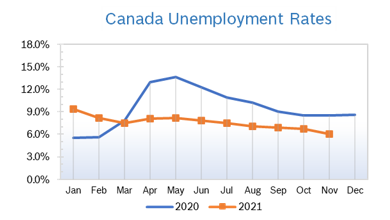|
Unemployment Falls to 6.0%
Consumer Prices Jump 4.7% The Consumer Price Index (CPI) jumped 4.7% in October after rising 4.4% year over year in September, the fastest pace since February 2003. Excluding gasoline, the CPI rose 3.3% year over year in October. Energy, housing and food prices are the key drivers for inflation, all areas where Canadians cannot easily curb spending. However, analysts note that doesn’t mean people will cut back on spending since many consumers saved money during the pandemic. Homeowner replacement costs, considered a marker for new home prices, rose 13.5% year over year, the sixth consecutive double-digit increase. The Bank of Canada (BoC) averages three measures of inflation to gauge underlying price pressures. Those three measures came in at an average of 2.67% in October, unchanged from September. The BoC’s target range for inflation is between 1% and 3%. Q3 GDP Grows 4.5% GDP grew 4.5% in the third quarter after shrinking in Q2, according to Statistics Canada. Household spending on semi-durable goods rose 14% and spending on services rose 6.3%. After four consecutive quarters of strong growth, new construction and renovations fell in the third quarter. The 5.2% drop in new construction was the largest drop since the second quarter of 2009. The savings rate dropped from 14% to 11% as CV19 restrictions eased and people returned to more normal activities such as traveling, shopping in person and eating out. GDP growth was ahead of expectations. Housing and Construction News Canada housing starts fell 3.7% in October to 236,554 units after falling to 251,151 units in September, according to Canada Mortgage and Housing Corporation (CMHC). Demand for housing remains strong but labor and supply constraints have been slowing down permits. The Canadian Real Estate Association reported October home sales rose 9% to 53,746 in October after rising to 49,485 units in September. On a non-seasonally adjusted basis sales fell 11.5% from last October and new listings were down almost 20%. Economists noted that the year-over-year decline was due to low inventory and rising prices which are both discouraging buyers. Eighteen of 31 markets reported increasing sales. Retail Sales Fall 0.6% Retail sales dropped 0.6% to $56.6 billion in September, due mostly to lower sales of automobiles which were primarily caused by supply issues and the global shortage of semiconductor chips. Sales decreased in 7 of 11 subsectors, representing 63.5% of retail trade. Core retail sales, which exclude gasoline stations and motor vehicle and parts dealers, decreased 0.3%. Retail sales were up 2.7% in the third quarter, the largest increase since the third quarter of 2020. In volume terms, quarterly sales were up 1.5%. Sales increased in 9 of 11 subsectors, representing 94.6% of retail trade. Retail Ecommerce Sales Rise 5.1% On a seasonally adjusted basis, retail ecommerce sales rose 5.1% in September. On an unadjusted basis, retail ecommerce sales were up 1.8% year over year to $3.2 billion in September, accounting for 5.3% of total retail trade. The share of ecommerce sales out of total retail sales increased 0.4% in September compared with August and was down 0.2% from September 2020. Retail Notes Amazon Web Services (AWS) has broken ground on a second cloud-computing server hub in Canada, this one located in Calgary. The project is expected to create up to 950 direct and indirect jobs in Canada by 2037. Amazon says that combined with their existing regional hub in Montreal, AWS will invest $21 billion in Canada by 2027. Canadian Tire’s third quarter net income fell from $326.3 million in Q3 last year to $279.5 million in Q3 2021. Comp store sales rose 1.4% for the quarter. Unlike many US retailers, CT is expecting consumers to shift spending back to travel, leisure and entertainment for the remainder of this year and on into 2022. Canadian Tire chartered four ships to move Christmas and winter items to Canada in time for the fourth quarter. They also ordered more products made and delivered sooner for brands sold exclusively by the chain, including Mastercraft Tools and Noma. CEO Greg Hicks said the company has enough product to fill the shelves and meet holiday demand. Canadian Tire is Canada’s largest general merchandise and apparel retailer. Canadian Tire is also taking advantage of storage capacity at their stores and corporate-owned real estate to hold excess inventory, as well as turning to a third-party logistics company. © Robert Bosch Tool Corporation. All rights reserved, no copying or reproducing is permitted without prior written approval.
|
Archives
July 2024
|








